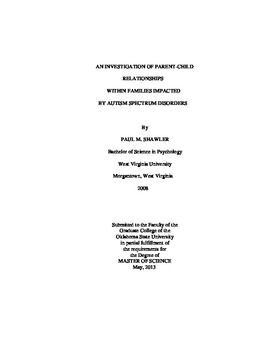| dc.contributor.author | Shawler, Paul M. | |
| dc.date.accessioned | 2014-09-24T14:18:17Z | |
| dc.date.available | 2014-09-24T14:18:17Z | |
| dc.date.issued | 2013-05-01 | |
| dc.identifier.uri | https://hdl.handle.net/11244/11126 | |
| dc.description.abstract | Objective: To expand the understanding of theoretical models of family dynamics involving parent stress, parenting behavior, child disruptive behavior problems, and autism symptom severity. The study aimed to replicate previous findings within the literature and expand existing models involving parent and child characteristics. Method: One-hundred thirty parents of children between the ages of 3 and 11 years with an Autism Spectrum Disorder were recruited through the Interactive Autism Network (IAN) Research Center at the Kennedy Krieger Institute and Johns Hopkins Medicine - Baltimore, sponsored by the Autism Speaks Foundation. Parents completed the Gilliam Autism Rating Scale-2, Parent Stress Index - Short Form, Parent Sense of Competence, Parenting Scale, Eyberg Child Behavior Inventory, and a demographic questionnaire. Results: Parents reported high levels of parent stress and child disruptive behavior problems. Associations demonstrated concordance with previously proposed theoretical models and expanded the development of disruptive behavior problems in the individuals with Autism Spectrum Disorder. Regression analyses using Bootstrapping method demonstrated parental self-efficacy and parenting strategies mediated the link between parent stress and child behavior problems while controlling for autism symptom severity. Conclusion: Given the high level of parent stress and the high rate of disruptive behavior problems exhibited by children with Autism Spectrum Disorders, comprehensive treatments for these children should take into account parents' stress, wellbeing, as well as the level of disruptive behavior problems that exist in the parenting role when raising a child with an Autism Spectrum Disorder. More research is needed to identify and understand mediating and moderating variables involved within families receiving treatment for Autism Spectrum Disorders. This research demonstrates that treatments should target disruptive behavior problems through parent training models designed to improve parental competency as well as parenting strategies to handle disruptive behavior problems. | |
| dc.format | application/pdf | |
| dc.language | en_US | |
| dc.publisher | Oklahoma State University | |
| dc.rights | Copyright is held by the author who has granted the Oklahoma State University Library the non-exclusive right to share this material in its institutional repository. Contact Digital Library Services at lib-dls@okstate.edu or 405-744-9161 for the permission policy on the use, reproduction or distribution of this material. | |
| dc.title | Investigation of Parent-Child Relationships Within Families Impacted by Autism Spectrum Disorders | |
| dc.type | text | |
| osu.filename | Shawler_okstate_0664M_12612.pdf | |
| osu.accesstype | Open Access | |
| dc.description.department | Psychology | |
| dc.type.genre | Thesis | |
